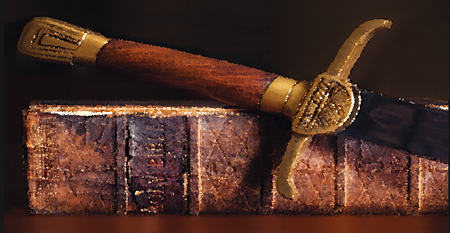I would like to share a few thoughts regarding Paul’s exhortation to Timothy in 1 Timothy 1:18-20:
“This charge I commit to you, son Timothy, according to the prophecies previously made concerning you, that by them you may wage the good warfare, having faith and a good conscience, which some having rejected, concerning the faith have suffered shipwreck, of whom are Hymenaeus and Alexander, whom I delivered to Satan that they may learn not to blaspheme.”
First, what does it mean for Timothy to wage the good warfare? It is evident that we are at war with Satan. There is the responsibility that each has to fight personally against Satan. This is why we don the armor of God (cf. Ephesians 6), that we may be able, “to withstand in the evil day, and having done all, to stand” (Ephesians 6:13).
Of course, as an evangelist, Timothy’s charge is more inclusive. Paul showed Timothy that the practitioners of sin (cf. 1:8-11), and the teachers of error (1:3-4), do damage to themselves and others. So, this warfare includes a defense of truth against sin and error. “Hold fast the pattern of sound words which you have heard from me, in faith and love which are in Christ Jesus” (2 Timothy 1:13).
Each of us have the same charge to some extent. That is why Jude exhorted his readers to “contend earnestly for the faith” (Jude 3).
Second, some reject the faith. We do not talk here about individuals who have never accepted it, but those who had once “tasted the good word of God and the powers of the age to come” (Hebrews 6:5), but who have fallen away (cf. Hebrews 6:6). Of these, Paul tells Timothy that some, “concerning the faith have suffered shipwreck.” The term shipwreck is not ambiguous. It is used only two times in the Greek. Here, and where Paul states that on three occasions he “was shipwrecked” (2 Corinthians 11:25).
Interestingly, the word faith can refer to either one’s personal faith, or “the” faith having reference to God’s revealed word, (cf. Jude 3). It seems here that Paul has both in mind. This may explain why the definite article “the” is supplied by translators, though it is not in the original text.
Their personal faith certainly suffered shipwreck. They were no longer faithful. As we noted from Hebrews 6, it is possible for the faithful to fall away, “crucify [-ing] again for themselves the Son of God, and put [-ing] Him to an open shame” (Hebrews 6:6).
However, the type of men Paul refers to have (as the ASV version states) “thrust from them made shipwreck concerning the faith.” In other words, they have separated themselves from the truth. Since two men are mentioned, we can know precisely Paul’s thoughts here. Hymenaeus is mentioned in 2 Timothy 2:17 as a false teacher, having taught “that the resurrection is past already.” Alexander is not known with certainty. There is mention of an Alexander in Acts 19:33 who blamed Paul for the turmoil in Ephesus. More likely is the reference to Alexander the coppersmith in 2 Timothy 4:14-15, who opposed the teaching of Paul, and was identified by Paul as a false teacher.
The text shows us the importance of the truth. That our responsibility is to defend it, and to expose those who would lead themselves and others astray. To do so is to “wage the good warfare.” To fail to do so is to endanger your own soul and the souls of others.
To see The Patternists Page on Facebook, click here, and Like!





